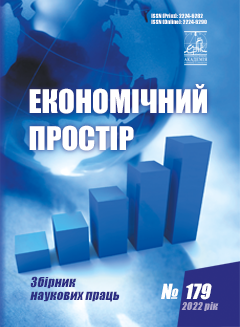BENCHMARKING OF THE CIRCULAR ECONOMY IN THE WORLD
Анотація
Circular economy is an important support for countries in the world to promote green and low-carbon transformation, and the development of circular economy is not a one-day achievement and requires all-round efforts. Due to the differences in the level of economic and social development of various countries or regions, it is determined that there must be differences in the starting point and path of developing circular economy in different countries or regions. Therefore, it needs a kind of thinking about where and where to start to build the benchmarking management of the world circular economy. Based on the above considerations, this paper discusses the positioning, role and challenges of global circular economy benchmarking management under the current carbon neutral strategic framework from the perspective of international economics. The strategy is briefly analyzed, and relevant countermeasures and suggestions are put forward.
Посилання
Su B W, Heshmati A, Geng Y, et al. (2013) A review of the circular economy in China: Moving from rhetoric to implementation. Journal of Cleaner Production, 42: 215-227.
Geng Y, Sarkis J, Bleischwitz R. (2019) How to globalize the circular economy. Nature, 565:153-155.
Stahel W R. (2016) The circular economy. Nature, 531: 435-438.
Zhu Dajian (2007) China's circular economy and sustainable development. Beijing: Science Press.
Zhu Dajian, Zhu Yuan (2013) In-depth study of circular economy theory in the context of ecological civilization. Proceedings of the Chinese Academy of Sciences, 28(2): 207-218.
China Circular Economy Association. Research Report on Circular Economy Helping Carbon Reach Peak (Version 1.0) [R]. 2021.
Opinions of the Central Committee of the Communist Party of China and the State Council on Completely Accurately Implementing the New Development Concept and Doing a Good Job in Carbon Neutralization [EB/OL].(2021-10-24).http://www.gov.cn/zhengce/2021-10/24/content_5644613.htm.
The State Council of China. Notice of the State Council on Printing and Distributing the Action Plan for Carbon Peaking Before 2030 (Guo Fa [2021] No. 23) [EB/OL]. (2021-10-26).
http://www.gov.cn/zhengce/content/2021-10/26/content_5644984.htm.
Data Information: An Overview of Academic Research and Government Planning for Global Carbon Neutrality. Proceedings of the Chinese Academy of Sciences, 2021, 36(3): 367-370.
H. James. Hareton, James. S. Hareton. Benchmarking—Aiming for and Beyond First-Class Enterprises [M]. Beijing: CITIC Press, 2003: 9, 12.
Xu Kuangdi. China Development High-level Forum 2005: Speech at the International Symposium on Building a Conservative Society [N]. Science and Technology Daily, 2005-06-28.
International Energy Agency. Clean energy progress after the Covid-19 crisis will need reliable supplies of critical minerals[R]. 2020.
Ellen MacArthur Foundation. The Circular Economy Opportunity for Urban & Industrial Innovation in China.(2018-9-19) [2021-08-30].https://emf.thirdlight.com/link/tfoi8n2iwpa8-bg-7jz3/@/preview/1?o.
Dong H J, Geng Y, Yu X M, et al. Uncovering energy saving and carbon reduction potential from recycling wastes: A case of Shanghai in China. Journal of Cleaner Production, 2018, 205: 27-35.
Awasthi A K, Li J H, Koh L, et al. Circular economy and electronic waste. Nature Electronics, 2019, 2(3): 86-89.
Meng Xiaoyan, Wang Yi, Zheng Xinzhu. Circular economy construction under the vision of carbon neutrality: management experience and enlightenment of Turku, Finland. Environmental Protection, 2021, 49(12): 76-80.
European Commission. Closing the loop: An EU action plan for the Circular Economy[Z]. 2015.
European Commission. A New Circular Economy Action Plan[Z]. 2020.
Liao Hongyun, Kang Yanbing, Zhao Meng. Policy points of the new EU circular economy action plan and its enlightenment to my country [J]. China Development Observatory, 2020(11): 55-58.
Federal Ministry for the Environment, Nature Conservation, Building and Nuclear Safety. German Resource Efficiency Programme I: Programme for the sustainable use and conservation of natural resources[Z]. 2012.
Federal Ministry for the Environment, Nature Conservation and Nuclear Safety. The German Resource Efficiency Programme Ⅲ: Programme for the sustainable use and conservation of natural resources[Z]. 2020.



